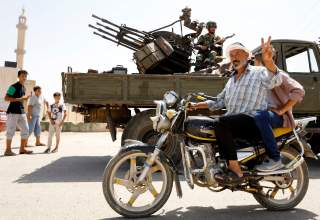Trump Should Uphold the Syrian Cease-Fire He Negotiated
Trump's team negotiated a ceasefire. Now he must uphold it.
Say what you will about President Trump, no one ever accused him of a lack of chutzpah. For good or ill, he can make pronouncements no one else does and take actions that no other leader would even consider—like meeting with North Korean leader Kim Jung Un. And, whenever a foreign leader does something he doesn't like—be it Justin Trudeau, Emmanuel Macron, or Angela Merkel—President Trump will call them out.
Yet, the President’s trademark chutzpah has been MIA in Syria. Unfortunately, this lack of chutzpah will harm U.S. interests across the Middle East. It will empower Iran, destabilize Jordan, and harm Israel, the country President Trump called America’s greatest friend.
The President must thump his chest and show he is committed to the ceasefire in southwest Syria that the United States agreed to a year ago. Otherwise, he risks allowing the Assad regime to force tens of thousands of Syrian refugees to seek Israeli protection by taking up camp along the Israeli border and force thousands more to join the over one million people who have fled to Jordan. Furthermore, a collapse of the ceasefire will bring Iranian-backed forces within shouting distance of the Israeli border.
Over the last few days, the Bashar al-Assad regime’s military has launched a major offensive into southwestern Syria near the Israeli border—a region that, until now, has been considerably more peaceful than the rest of Syria. (Full disclosure: the authors of this piece work for the Multifaith Alliance for Syrian Refugees, which works to get humanitarian aid to internally-displaced refugees in Syria, particularly in the southwest portion of the country). Also, the Assad regime’s incursion is supported by Russian air power and Iranian-backed militias. This is a blatant violation of the American-led ceasefire in Syria. In fact, Syria and its protector Russia unilaterally declared an end to the ceasefire.
This is where President Trump's chutzpah has been so glaringly absent. This is where he must show off the President Trump many have come to expect if he wants to avert what will be a significant victory for Iran and a severe setback to Jordan and Israel. Normally, someone who violated an agreement with President Trump would find themselves publicly eviscerated. People who have violated agreements with the President have been sued, called out on Twitter, and berated. However, the President has stood by silently while the Syrian regime openly flouts a ceasefire agreement that his administration negotiated.
Why is this so good for Iran? Because it would make the Iranian-backed "Shia crescent" nearly complete. It would spread Iranian influence all the way from Tehran to Israel's doorstep. Further, it will be a clear signal that despite the purported pressure the Trump Administration placed on Iran by pulling out of the Iran Nuclear Deal, Iran can actively counter U.S. interests, seemingly with impunity.
Why is this so bad for Jordan? Simply put, the nation can’t even support the over 1.4 million refugees it is already housing. Any more refugees and the entire refugee-support apparatus in Jordan may collapse.
And why is this so bad for Israel? Because 170,000 refugees have already fled to the Syrian border with Israel and will be banking on Israel's tacit protection. After all, Israel could not accept a mass casualty event along its border—and the mass killing of civilians has been witnessed time again as the war in Syrian grinds on into its eighth year.
This dynamic risks dragging Israel deeper into the Syrian civil war, a conflict in which Israel has steadfastly avoided military involvement. While Israel has already facilitated the delivery of hundreds of millions of dollars of humanitarian aid into southwestern Syria, the flight of potentially hundreds of thousands of refugees to its border would create a humanitarian crisis on a whole new scale, including the potential for international pressure to allow them entry into Israel. Moreover, while Israel has for years allowed Syrians to cross its border for medical treatment, and is providing aid to those fleeing the current bombing, opening its borders to this massive number of refugees would present untold complexities.
America’s foes would be worse off, and America’s allies better off, then, were southwest Syria to remain free from Assad regime forces.
So, what should the President do? He can start by taking to Twitter. He can lambast Putin and Assad for violating the ceasefire and warn them that continuing this incursion into southwest Syria would be bad for both the regime and Russia. In the Syrian context, President Trump’s threats carry real weight—after all, the President has already ordered two missile strikes on Syrian military targets. For Russia, backing an Assad campaign that violates the ceasefire and creates yet more images of destruction, human suffering and the mass movement of displaced victims can hardly be the desired setting for the July Putin-Trump summit in Helsinki.
Various of America’s traditional allies have begun to question President Trump’s commitment to traditional U.S. alliances. That, however, has decidedly not been the case with Israel. The President, after all, has unilaterally moved forward on moving the U.S. embassy to Jerusalem. In the same fashion, the President should counter Iran, stand by Jordan and Israel, and help to prevent a humanitarian catastrophe along its border with Syria. And all he has to do is be himself. All he has to do is have some chutzpah.
Bennett Gross and Shadi Martini are the Executive Director and Director of Humanitarian Relief, respectively, at the Multifaith Alliance for Syrian Refugees.

